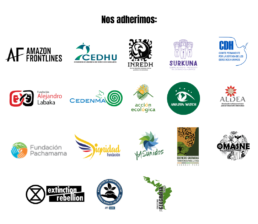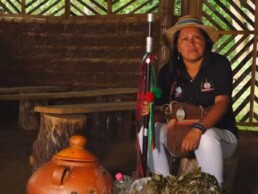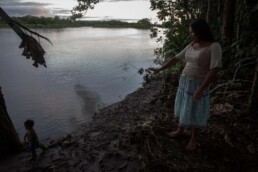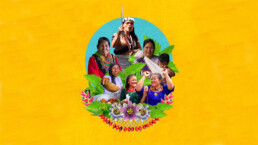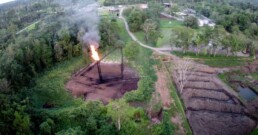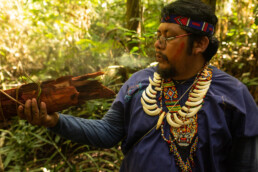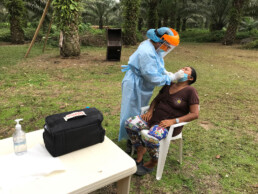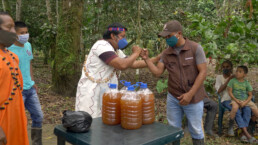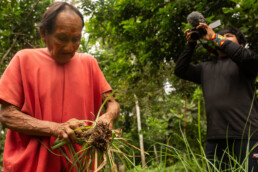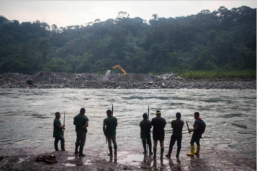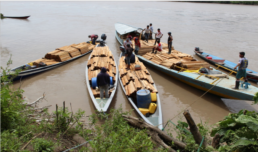PEDIDO DE ACCIÓN URGENTE por el asesinato de la Gobernadora Indígena Sandra Liliana Peña Chocué
Sr. Iván Duque
Presidente República de Colombia
Sr. Francisco Barbosa Delgado
Fiscal General Colombia
Sra. Antonia Urrejola
Presidente CIDH
Sr. Francisco Cali Tzay
Relator PPII NNUU
Sra. Mary Lawlor
Relator Especial sobre la situación de los defensores de los derechos humanos
Como es de conocimiento público el 20 de abril fue asesinada cobardemente en su domicilio Sandra Liliana Peña Chocué, gobernadora del Resguardo La Laguna – Siberia del municipio de Caldono en el departamento del Cauca. Sandra Liliana lideraba de manera enfática la determinación de sus autoridades asamblearias y tradicionales de ejercer Gobierno Propio en su territorio ancestral gravemente atacado por actores armados regulares e irregulares que pretenden ejercer control sobre el mismo mediante diversas estrategias de control y despojo.
Quienes suscribimos este pedido de ACCIÓN URGENTE vemos con mucha preocupación que este no resulta ser un hecho aislado, no solo porque las instituciones competentes tenían suficiente información sobre la situación de riesgo que enfrentaba Sandra Liliana; porque en diversos espacios de la Minga Nacional por la Vida, se han realizado y reiterado denuncias, peticiones y exigencias frente a hechos de riesgo; y, de manera especial, porque en Colombia solo en lo que va de este año se han sido asesinados 52 líderes y defensores de derechoshumanos (18 de ellos indígenas) y más de mil 166 desde la firma final del Acuerdo de Paz, según los registros del Instituto de estudios para el desarrollo y la paz (Indepaz) sin que por parte del Gobierno del Presidente Duque se implementen las garantías mínimas para su protección. Pese a que el Presidente Duque condena frecuentemente y de manera publica estos hechos la política y programas gubernamentales de prevención y protección no resultan eficaces ni incorporan de menara idónea criterios de carácter diferenciado.
A lo largo de este año, diversas organizaciones indígenas y de DDHH en Colombia han denunciado un incremento significativo de acciones bélicas de corte narcoparamilitar en territorios indígenas qué provocan, entre otros hechos, desplazamiento, confinamiento, reclutamiento y exterminio de sus integrantes, estos hechos que se presentan en diversos territorios indígenas a lo largo del país ocurren de manera aguda y sistemática en el Cauca. La presencia y fortalecimiento de estos grupos armados tienen especial relevancia en zonas donde la institucionalidad estatal es casi inexistente o deficiente favoreciendo que estos grupos se impongan.
En noviembre de 2016, el gobierno colombiano y las Fuerzas Armadas Revolucionarias de Colombia (FARC) llegaron a un histórico acuerdo de paz, que llevó a la desmovilización del que entonces era el principal grupo armado del país. El acuerdo incluyó iniciativas específicas para prevenir asesinatos de defensores/as de derechos humanos, pese a ello los asesinatos de defensores/as de derechos humanos aumentan drásticamente ante la falta de investigaciones diligentes que esclarezcan y sancionen dichos hechos.
La labor que realizan algunos defensores de derechos humanos —por ejemplo, oponiéndose a la presencia de grupos armados o denunciando abusos— los ha convertido en blanco de ataques. Otros han sido asesinados durante ataques de carácter más general perpetrados por los grupos armados contra la población civil. Los asesinatos han dejado al descubierto las dinámicas invisibilizadas de violencia y abuso en regiones remotas de Colombia, donde la presencia de autoridades judiciales y la policía frecuentemente es escasa. Esta ausencia de instituciones del Estado ha dejado a innumerables comunidades indefensas.
Por ello hacemos eco de los reiterados reclamos de la ONIC y otras organizaciones indígenas al gobierno nacional “para que se atienda esta situación de manera inmediata, pues la omisión es un acto que contribuye al genocidio indígena; así como también que la alternativa no es una mayor militarización, sino el fortalecimiento de la Guardia Indígena, el establecimiento de un diálogo de Autoridad a Autoridad y la implementación del Acuerdo de Paz”.
Frente al incremento de actos de violencia contra miembros de Pueblos Indígenas, defensores/as de derechos humanos, líderes sociales y firmantes de paz es prioritario que el Estado colombiano adopte medidas urgentes e integrales para reforzar los sistemas dirigidos a la prevención de la violencia y protección de este colectivo, así como avanzar con la debida diligencia de las investigaciones de delitos cometidos en su contra. De manera particular resulta perentorio que se establezcan y ejecuten medidas de protección idóneas y coordinadas con las autoridades indígenas del Cauca, y se tomen las medidas de protección espiritual yfísica para armonizar y prevenir las múltiples violaciones a los derechos humanos que atentan contra sus territorios y contra su pervivencia.
Por ello EXIGIMOS el Presidente Duque que en cumplimento de las obligaciones con su país y con la comunidad internacional garantice la implementación del Acuerdo de Paz en todas sus dimensiones y particularmente para que en todo el territorio estén dadas las condiciones para el ejercicio de la defensa de los derechos humanos y de las comunidades y particularmente garantice la labor que realizan defensores/as y líderes como Sandra Liliana que ejerciendo autoridad desarrollan acciones legítimas para la protección de sus territorios y su integridad, muchas veces ante la ausencia estructural del estado, el incumplimiento sistemático de acuerdos y la militarización de sus territorios.
El gobierno de Iván Duque debe realizar esfuerzos genuinos para financiar e implementar los programas y mecanismos orientados a proteger a defensores de derechos humanos y lideres sociales y territoriales, lo que debe implicar la asignación presupuestaria suficiente para la implementación de planes y mecanismos, la coordinación efectiva entre los mecanismos existentes y derogar o modificar aquellos que resultan ineficaces o tienen un mandato poco claro.
Sobre el asesinato de Sandra Liliana exigimos a la Fiscalía General de la Nación, Procuraduría, Defensoría del Pueblo y demás organismos concernidos para que investiguen este asesinato de manera diligente, determinen quienes son los responsables materiales e intelectuales de este hecho y los sancione enérgicamente, con el fin de que este hecho no se sume a los cientos de asesinatos indígenas del Cauca que se encuentran en la impunidad; así mismo resulta imperativo que adopten las medidas urgentes y con enfoque diferenciado para evitar que se sigan produciendo hechos similares.
Elevamos el conocimiento de la situación ante la Comisión Interamericana de Derechos Humanos, la Relatoría de Naciones Unidas sobre Derechos de los Pueblos Indígenas y la Relatoría sobre la situación de los defensores de los derechos humanos requiriendo su inmediata intervención en cumplimento de su mandato, particularmente a efectos de recordarle al Estado Colombiano su obligación convencional de propiciar un entorno libre de hostilidades y el respeto a las libertades fundamentales de las personas defensoras de derechos humanos, líderes y lideresas sociales en el marco de la implementación del Acuerdo de Paz para que puedan ejercer libre y eficazmente su labor y las implicaciones internacionales que tiene la omisión de esta obligación.
A los familiares de Sandra Liliana, a su comunidad, a la Asociación de Cabildos Indígenas del Norte del Cauca, a la Guardia Indígena, al Consejo Regional Indígena del Cauca y a todas las comunidades de pueblo Nasa, nuestro abrazo fraterno y nuestro acompañamiento solidario ante la gravedad de los hechos y amenazas que enfrentan.

Urgent Action for the murder of Indigenous Defender Sandra Liliana Peña Choqué in Colombia
Iván Duque
President of the Republic of Colombia
Antonia Urrejola
President of the Interamerican Commision on Human Rights
Francisco Cali Tzay
Special Rapporteur on the Rights of Indigenous Peoples, United Nations
Mary Lawlor
Special Rapporteur on the situation of human rights defender
On April 20th, Sandra Liliana Peña Choqué, governor of the La Laguna Reserve in Siberia of the Caldono municipality in the department of Cauca, was cowardly murdered in her home. Sandra Liliana emphatically led the assemblies and traditional authorities determined to self govern her ancestral territory which was gravely attacked by regular and irregular armed actors that attempted to gain control through strategies of displacement and other methods.
The signers of this request for URGENT ACTION note with great concern that this is not an isolated act. Not only did the relevant institutions have sufficient information about the risks faced by Sandra Liliana, which were presented repeatedly during spaces within the Minga Nacional por la Vida and other reiterated requests, complaints, and demands, but especially because in Colombia this year alone 52 leaders and human rights defenders have been killed (18 of them Indigenous and more than 1,166 since the Peace Accords were signed according to Indepaz. Despite this, the government of President Duque had not implemented minimum measures for her protection.
Throughout this year, Indigenous and human rights organizations have denounced the significant increase in armed narco-paramilitary incidents in Indigenous territories that provoke, among other consequences, displacement, confinement, recruitment and extermination of Indigenous people. This is the reality present in a number of Indigenous territories across the country, and in a particularly acute and systematic way in the Cauca region.
We therefore echo their demands to the national government “so that it attends to this situation immediately, as the omission to do so is an act that contributes the genocide of Indigenous peoples; and that the alternative is not more militarization but rather strengthening of autonomous Indigenous Gaurds, the establishment of dialogue between state and Indigenous authorities and the implementation of the Peace Accords.”
In the face of increasing acts of violence against members of Indigenous peoples, human rights defenders, social leaders and signers of the Peace Accords it is of the utmost priority that the Colombian State adopt urgent and integral measures to reinforce systems aimed at the prevention of violence and the protection of these collectives, as well as the advancement of due diligence in the investigation of crimes committed against them. Particularly, the establishment and implementation of appropriate protection measures in coordination with Indigenous authorities in Cauca, and the carrying out of spiritual and physical protection measures to harmonize and prevent the varied violations of human rights that threaten their territories and survival, is urgent.
We therefore DEMAND that President Duque, in keeping with national and international obligations, guarantees the implementation of the Peace Accords so that conditions exist in Colombia to defend human rights and the rights of Indigenous communities and to guarantee the work of defenders and leaders like Sandra Liliana that within their authority develop legitimate actions for the protection of their territories and safety, often in the structural absence of the State, the systematic non-compliance of agreement and the militarization of their territories.
In relation to the murder of Sandra Liliana we demand that the Fiscalía General de la Nación, the Procuraduría, the Defensoría del Pueblo and other organisms tasked with the investigation of this murder determine with dilligence those responsible for the material and intellectual crimes and charge them accordingly, with the objective that this act is not added to the list of hundreds of murders of Indigenous leaders of Cauca that remain in impunity. At the same time, it is imperative that urgent and culturally appropriate measures are adopted to avoid similar crimes.
We elevate this knowledge of the current situation to the Interamerican Commission on Human Rights, the Special Rapporteur of the United Nations on the Rights of Indigenous Peoples and the Special Rapporteur of the United Nations on the situation of human rights defenders requiring their immediate intervention in compliance with their mandate. Particularly, to remind the Colombian State of its obligation to provide an environment free of hostilities and the respect of fundamental liberties of human rights defenders and social leaders within the framework of the implementation of the Peace Accords so they can freely and effectively carry out their labor, and of the international implications that the omission of this obligation carries.
To the family of Sandra Liliana, her community, the Asociación de Cabildos Indígenas del Norte del Cauca, the Indigenous Guard, the Consejo Regional Indígena del Cauca and each and every Indigenous community of the Nasa peoples, we extend our deepest sympathies, our solidarity and our accompaniment before the serious incidents and continued threats you face.

Un año del derrame en la Amazonia ecuatoriana
Hoy se conmemora un trágico aniversario en la Amazonía ecuatoriana. Un año atrás, el 7 de abril, en el pico de la pandemia de COVID-19, un masivo derrame de petróleo golpeó a los territorios indígenas a lo largo de los ríos Napo y Coca, en la biodiversidad de la región de las cabeceras de la Amazonía ecuatoriana. Trescientos sesenta y cinco días han transcurrido, y aún 27,000 personas del pueblo Kichwa siguen sin acceso de comida y agua fresca, con riesgo de nuevas rupturas en los oleoductos. Para resaltar este penoso aniversario, cientos de indígenas están movilizándose hacia la ciudad amazónica del Coca para presionar a la justicia y obtener una reparación ambiental respecto del peor desastre petrolero en el Ecuador en los últimos quince años.
Los intereses económicos industriales continúan ocultando las voces, derechos y reclamos del pueblo indígena Kichwa afectado, cuyos ríos son su modo de subsistencia. Hace menos de dos semanas, la Corte Provincial de Orellana en Ecuador, rechazó el recurso de apelación de la sentencia en primera instancia de la demanda presentada por 105 comunidades indígenas, organizaciones indígenas y organizaciones de derechos humanos, entre las que se encuentra Amazon Frontlines, en contra del estado ecuatoriano y las empresas petroleras responsables del derrame de petróleo. Al negar la justicia (nuevamente) al pueblo Kichwa, las cortes ecuatorianas están fallando a las poblaciones que han jurado proteger, actuando en beneficio del interés de la industria de los combustibles fósiles. Esta decisión contraviene la innovadora Constitución del país al ser incapaz de salvaguardar los Derechos de la Naturaleza, y socava las obligaciones gubernamentales de garantizar los derechos colectivos de los Pueblos Indígenas.
“El juez puso los intereses petroleros sobre nuestros derechos. Demandamos justicia. Nuestras familias todavía sufren del desastroso impacto de este derrame, y todavía no tenemos agua fresca y comida. Nuestras comunidades están unidas para defender nuestros ríos para las futuras generaciones.”
Veronica Grefa, Líder Kichwa
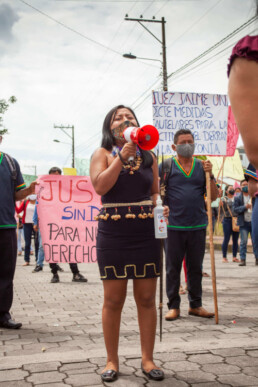
El caso Kichwa revela una vez más la influencia de la industria petrolera sobre la rama judicial del Ecuador y su complicidad en la impunidad de las corporaciones, señala violaciones de los derechos de los Pueblos Indígenas, y racismo sistémico. A pesar de la abrumadora evidencia presentada por los demandantes indígenas, expertos y abogados, y una clara negligencia del gobierno y las compañías petroleras para responder adecuadamente, la sentencia de Corte Provincial de Orellana se alineó con los intereses políticos y económicos y abandonó a los Kichwa, dejándolos en un gran riesgo permanente.
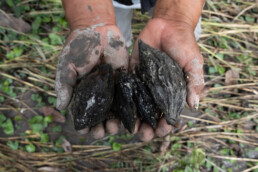
“Nuestros ríos están contaminados, nuestros niños están enfermos, nuestras huertas están arruinadas, los peces han desparecido. Ni el Estado ni las compañías han cumplido con sus obligaciones. No hay justicia para los Pueblos Indígenas. Vamos a contraatacar. "
Carlos Jipa, Federación de Comunas Unión de Nativos de la Amazonía Ecuatoriana, FCUNA
Aún más, el mismo juez que falló en contra de la demanda de los pueblos Kichwa recientemente presentó una demanda penal en contra de los demandantes y los defensores de derechos humanos que manejaron el caso. Hoy, el líder kichwa Carlos Jipa y la abogada de Amazon Frontlines María Espinosa, entre otros, serán obligados a testificar en la Corte Provincial de Orellana sobre la base de acusaciones sin fundamento de instigar a la “inestabilidad social” a través de la organización de marchas, movilizaciones y presencia en los medios sociales de comunicación demandando justicia para los Kichwa. El peligroso mal uso del sistema judicial del juez Jaime Oña ha perseguido y criminalizado tanto a las víctimas como a los defensores de derechos humanos y envía el estremecedor mensaje de que las cortes ecuatorianas no son un lugar seguro para buscar justicia. Grupos indígenas, organizaciones de la sociedad civil, y la Alianza por los Derechos Humanos de Ecuador denunciaron las acusaciones criminales del juez Oña, y se comprometieron a apoyar en la lucha contra los defensores de los derechos humanos y del medio ambiente.
La injusticia en el caso de los Kichwa lamentablemente no es una anomalía en el país. El derrame del 7 de abril de 2020 se inscribe dentro de un doloroso legado de más medio siglo de contaminación petrolera y violencia en contra de los Pueblos Indígenas, que se extiende hasta el descubrimiento de petróleo en la región norte de la Amazonía ecuatoriana en los años sesenta. Pero este derrame golpeó en medio de la pandemia por COVID-19, lo que intensificó terriblemente las amenazas a la supervivencia de las comunidades indígenas.
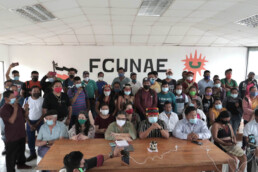
Hay numerosos casos legales presentados por los pueblos indígenas de la Amazonía contra los abusos de la industria petrolera, que siguen en curso en Ecuador. Entre ellos se encuentra una batalla legal de 25 años contra el gigante petrolero Chevron-Texaco y la demanda del pueblo Waorani contra las empresas petroleras responsables del derrame en el río Shiripuno en noviembre de 2020. Aunque la justicia tarda en llegar en muchos casos, el movimiento indígena de Ecuador ha dado grandes pasos para promover los derechos de los indígenas en el país en los últimos años y ha conseguido varias victorias legales sin precedentes en contra de los intereses de la industria. Desde la victoria del pueblo Waorani contra las grandes petroleras, pasando por la victoria de los Kofán de Sinangoe contra la minería del oro, hasta la más reciente sentencia histórica contra la práctica de la industria petrolera de quemar gas. Son una serie de victorias que atestiguan la resistencia y el poder de los pueblos indígenas para proteger la Amazonía y nuestro clima del colapso.
Las comunidades Kichwa afectadas por el derrame de petróleo se mantienen unidas y decididas a luchar. En las siguientes semanas, cuando los ecuatorianos regresan a las urnas para escoger su nuevo Presidente, el pueblo Kichwa llevará su caso a la Corte Constitucional y escalará su demanda de justicia. Muchos pueblos indígenas temen que los dos candidatos presidenciales aumenten sus esfuerzos para reactivar la economía ecuatoriana, que está muy endeudada, mediante la expansión de proyectos de extracción petrolera y minera, en los territorios indígenas de la Amazonía.
Como gran parte del mundo, Ecuador se encuentra ante una disyuntiva moral y ecológica en el camino. ¿Los dirigentes del país se reafirmarán en la destrucción y el atropello de los derechos de los indígenas, o iniciarán una nueva era de justicia aplicando la Constitución y adoptando una conservación liderada por indígenas de su recurso más preciado, la Selva Amazónica?
A Kichwa fisherman's testimony in the wake of a disastrous oil spill
A Kichwa Woman's Fight For Her People's Survival Amid An Oil Spill & COVID-19
Healing Rivers of the Amazon
Ayúdanos a transmitir el mensaje y comparte nuestra historia con tus amigos y familia. Solidaricémonos con el pueblo Kichwa, #SOSDerrameAmazonia!
1-Year Anniversary Oil Spill in Ecuador's Amazon
Today marks a tragic anniversary in the Ecuadorian Amazon. One year ago on April 7, at the peak of the pandemic, a massive oil spill struck Indigenous territories along the Napo and Coca rivers in the biodiverse headwaters region of Ecuador’s Amazon. Three hundred and sixty-five days have passed, but 27,000 Kichwa people remain without access to safe water and food and at risk of new pipeline ruptures. To mark this inauspicious anniversary, hundreds of Indigenous peoples are mobilizing in the Amazonian city of Coca to press for justice and reparations for Ecuador’s worst oil disaster in the last fifteen years.
Industrial economic interests continue to obscure the voices, rights and demands of the affected Kichwa people, whose rivers are their lifeline. Less than two weeks ago, the Provincial Court of Orellana in Ecuador rejected Indigenous people’s appeal in a lawsuit brought forward by 105 communities, Indigenous organizations and human rights organizations, including Amazon Frontlines, against the Ecuadorian State and oil companies responsible for the oil spill. By denying justice to the Kichwa (again), Ecuador’s courts are failing the populations they are sworn to protect, acting instead in the interest of the fossil fuel industry. This decision tarnishes the country’s groundbreaking Constitution by failing to uphold the Rights of Nature and undermines its commitments to Indigenous peoples’ collective rights.
“The judge placed oil interests above our rights. We demand justice. Our families still suffer from the disastrous impacts of this spill, and we still don’t have clean water and food. Our communities are united to defend our rivers for future generations.”
Veronica Grefa, Kichwa leader

The Kichwa’s case once again reveals the oil industry’s hold on Ecuador’s judicial branch and its complicity in corporate impunity, state violations of Indigenous people’s rights, and systemic racism. Despite overwhelming evidence of rights violations submitted by Indigenous plaintiffs, experts and lawyers, and a clear failure to adequately respond by the government and oil companies, the Provincial Court of Orellana’s ruling sided with political and economic interests and abandoned the Kichwa, leaving them at grave ongoing risk.

“Our rivers are polluted, our children are sick, our food gardens are ruined, the fish have disappeared. The State and companies have not complied with their obligations. There is no justice for Indigenous people. We will fight back.”
Carlos Jipa, president of the Kichwa Indigenous federation, FCUNAE
Outrageously, the same judge who ruled against the Kichwa peoples’ lawsuit recently filed a criminal complaint against the plaintiffs and human rights defenders who brought the case. Today, Kichwa leader Carlos Jipa and Amazon Frontlines lawyer Maria Espinosa, among others, will be forced to testify in the Provincial Court of Orellana against baseless accusations of instigating “social unrest” through the organization of marches, mobilizations and advocacy on social media to demand justice for the Kichwa. Judge Jaime Oña’s dangerous misuse of the justice system to persecute and criminalize both victims and human rights defenders sends a chilling message across the globe that Ecuador’s courts are not a safe place to seek justice. Indigenous groups, civil society organizations and Ecuador’s Human Rights Alliance denounced Judge Oña’s criminal allegations, and vowed to support the fight against criminalization of human and environmental rights defenders.
The injustice of the Kichwa’s case is sadly not an anomaly in the country. The April 7,,2020 oil spill sits within a painful legacy of over half a century of oil contamination and violence against Indigenous peoples, dating back to the discovery of oil in Ecuador’s northern Amazon region in the 1960s. But this oil spill struck in the middle of the pandemic, greatly intensifying the threat to Indigenous communities’ survival.

There are numerous legal cases filed by Amazonian Indigenous peoples against oil industry abuses still underway in Ecuador. Among them are a 25-year legal battle against oil giant Chevron-Texaco and the Waorani peoples’ lawsuit against oil companies responsible for a spill on the Shiripuno river in November 2020. Although justice lags in many cases, Ecuador’s Indigenous movement has made huge strides to advance Indigenous rights in the country in recent years and won several unprecedented legal victories against industry interests. From the Waorani people’s victory against big oil to the Kofan of Sinangoe’s victory against gold mining to the more recent landmark ruling against the oil industry’s practice of gas flaring, a string of victories testify to Indigenous peoples’ resilience and power to protect the Amazon and our climate from collapse.
Kichwa communities affected by the spill remain united and determined to fight back. In the coming weeks, as Ecuadorians return to the polls to choose their new President, the Kichwa will take their case to the Constitutional Court and escalate their demands for justice. Many Indigenous peoples fear that the two leading Presidential candidates are set to ramp up efforts to revive Ecuador’s debt ridden economy by expanding oil and mining extraction projects in Indigenous territories in the Amazon.
Like much of the world, Ecuador is at a moral and ecological fork in the road. Will the country’s leaders double down on destruction and the trampling of Indigenous rights, or will they usher in a new era of justice by enforcing the Constitution and embracing Indigenous-led conservation of its most precious resource, the Amazon rainforest?
A Kichwa fisherman's testimony in the wake of a disastrous oil spill
A Kichwa Woman's Fight For Her People's Survival Amid An Oil Spill & COVID-19
Healing Rivers of the Amazon
Help spread the word today by sharing this story with your friends and family. Let’s all stand in solidarity with the Kichwa as they demand #JusticeForTheAmazon!
Ecuadorian Court Rejects Indigenous People’s Lawsuit After Disastrous Oil Spill In Amazon During Pandemic, Reinforcing Legacy of Corporate Impunity
For immediate release
(Coca, Ecuador. 24th March 2021) — Nearly one year after a disastrous oil spill dumped an estimated 15,800 barrels (664,000 gallons) of crude oil and other pollutants into Amazon rivers and tributaries, the Provincial Court of Orellana has rejected an appeal from affected Indigenous communities in a high-stakes lawsuit that demanded urgent environmental and community reparations from the Ecuadorian government and oil companies responsible. The outcome marks a grave blow to Ecuador’s pioneering Constitution, which was the first in the world to incorporate the rights of nature, and denies justice to more than 27,000 Indigenous people, who depend on the Coca and Napo rivers for drinking water in the biodiverse headwaters region of Ecuador’s Amazon.
The lawsuit, filed by Kichwa federation FCUNAE, Indigenous organizations, human rights groups and affected residents, said oil companies OCP Ecuador and Petroecuador EP and the environment and energy ministries had violated the constitutional rights of Indigenous people and the rights of nature. The verdict, issued yesterday by the appeals court judge after five months of unjustifiable delays, cites that the case was filed in the incorrect legal venue and that other administrative, civil and criminal mechanisms exist to address plaintiff’s claims for remediation and redress.
Plaintiffs and lawyers were subpoenaed last week and now face criminal charges for their work defending the Kichwa, following baseless allegations of intimidation and instigation in a lawsuit filed by the lower-court judge. Communities and human rights organizations denounce this action as dangerous persecution of human rights defenders and chilling evidence of the judicial branch’s attempts to discredit the Kichwa’s claim.
Throughout the trial, plaintiffs presented overwhelming evidence, testimony and first-hand accounts that the State and oil companies acted negligently and violated the rights of the Kichwa and of nature. OCP Ecuador, Petroecuador EP, and the Ministries of Environment and Water and of Energy and Non-Renewable Resources were unable to demonstrate that adequate measures were taken to prevent the spill, though they had been warned of regressive erosion in the area by scientists and experts since the collapse of the San Rafael waterfall on February 2, 2020.
Moreover, after the spill occurred, the entities responsible did not act to fully repair the damage to the affected population or to restore the natural environment. Community members, who received limited medical attention and food and water supplies, say the aid has been wholly insufficient and came with strings attached. Communities also report ongoing contamination after oil pipeline operators halted clean-up operations prematurely in September 2020. Reports from the Ministry of the Environment and Water indicate that areas on the banks of the Napo and Coca Rivers still have oil remnants less than a meter deep. Indigenous community members report a significant decrease in catch available for fishing, skin diseases from oil exposure, and impacts to their cultural and spiritual practices connected to the river.
The outcome of the case reinforces a decades-long legacy of impunity for Ecuador’s oil industry and gives a free pass to oil companies, OCP and Petroecuador, to continue to pollute the Amazon while skirting compliance with comprehensive remediation of affected ecosystems and impacted communities. Since the April 7, 2020 oil spill, at least one new major oil spill was reported in the region on November 27, 2020 in the Shiripuno river, which decimated vital resources that the Waorani and the isolated Tagaeri and Taromenane tribes rely on.
On April 7, 2021 exactly one year after the oil spill, hundreds of Indigenous peoples will mobilize in the Amazonian city of Coca to denounce impunity and call for justice. Plaintiffs will take their case to Ecuador’s Supreme Court and pursue all legal options nationally and internationally, as necessary.
About the oil spill
The SOTE and OCP pipelines ruptured earlier this year as a result of negligence in addressing forewarned headward erosion on the Coca and Napo rivers. Backed by human rights organizations, Indigenous communities immediately filed a lawsuit asking for remediation, redress, and an end to oil company impunity on behalf of 27,000 Indigenous people from 105 different communities who were affected by the oil spill. The case was then suspended for seventy-five days due to the judge citing health concerns, as ongoing erosion and massive landslides threatened a second oil spill.
On August 4, 2020, more than two months after the case was filed, Kichwa communities along the spill zone escalated their demands by filing dozens of lawsuits to trigger court-ordered injunctions that would shutdown the oil pipelines. The risk of another catastrophic event was on display in the lead-up to the lower court’s decision when part of the highway along the same section of river collapsed due to erosion and state negligence. On September 1, 2020 a lower court judge dismissed the case, citing that it was the incorrect legal venue. Plaintiffs responded by appealing to demand justice, backed by 14,000 letters of global support.
DECLARATIONS
Carlos Jipa, president of the Kichwa Indigenous federation, FCUNAE, released the following statement:
“Indigenous communities reject the ruling issued by the Orellana court. We feel outraged that the Ecuadorian judicial system has failed to recognize the violations to our rights and the damages caused to our lives, our rivers, and our territory. Our rivers are polluted, our children are sick, our food gardens are ruined, the fish have disappeared. The State and companies have not complied with their obligations. There is no justice for Indigenous people. We will fight back.”
Veronica Grefa, Kichwa leader and President of Toyuca community, released the following statement:
“As a Kichwa Indigenous woman, I will continue to fight for my people’s rights and lives. We demand justice. Our families still suffer from the disastrous impacts of this spill, and we still don’t have clean water and food. Our communities are united to defend our rivers for future generations.”
Andrés Tapia, Member of the Leadership Council of Amazonian indigenous organization, CONFENIAE, released the following statement:
“The Kichwa’s lawsuit has exposed the deficiency of Ecuador’s justice system. Cases are stalled or move forward according to national political agendas. But when it comes to serving justice to the most vulnerable, judges turn a blind eye and delay effective responses. In the case of the Kichwa people, who have suffered clear rights violations as a consequence of the oil spill in the Coca and Napo rivers, a year has passed without any response and now impunity continues.”
Maria Espinosa, Lawyer for the case from Amazon Frontlines, released the following statement:
“We deeply regret that corporate power has prevailed over the truth and the rights of the victims. We are shocked that the judges did not recognize the violations of constitutional rights and damages resulting from the oil spill and that the rights of nature are not even acknowledged in the sentence. Together with the communities, we will continue to fight and pursue all legal options nationally and internationally because the rights of 27,000 Kichwa people and the rights of nature have been clearly violated. These violations persist to date, and continue to cause very serious impacts on the physical and cultural survival of the Kichwa people and their territories ”.
###
Additional photos and spokespeople available upon request.
Contact
Sophie Pinchetti
Amazon Frontlines
sophie@amazonfrontlines.org
(+593) 98 148 4873
Meet Seven Indigenous Women Fighting for their Cultures and Territories in the Amazon
Across the Amazon, Indigenous women are fighting to protect their cultures, lands and lives. Today, on International Women’s Day, we celebrate the power of Indigenous women as powerful leaders in building just and sustainable solutions to the twin crises of climate change and biodiversity loss, and we invite you to get to know seven inspiring women defenders from the Kofan, Siona, Siekopai and Waorani nations.
Working closely with our sister organization, the Ceibo Alliance— the first Indigenous-led intertribal alliance of its kind across Ecuador, Peru, and Colombia— these women are working to protect five million acres of rainforest from natural resource extraction and industrial encroachment. In a coordinated effort across their communities, they are advancing female empowerment and leadership, movement building, community organizing, territorial mapping and monitoring initiatives. They are also creating community-led enterprises and women’s associations that focus on income-generating socio-agricultural projects, as well as the recovery of plant medicines and traditional healing systems to offer sustainable economic alternatives for Indigenous women, families and communities.
Alicia Salazar
“As women, we are organizing and uniting to defend our territories so that our children may live in a healthy environment, free from contamination. We are fighting to protect and sustain our territory and biodiversity for future generations. We are deeply connected to our Mother Earth, we are defenders of life.”
- Alicia Salazar, Siona Leader & Director of Ceibo Alliance
Alicia Salazar is a Siona leader and Director of the Ceibo Alliance. Born on the banks of the Putumayo River, on the border between Ecuador and Colombia, in the ancestral territory of the Siona nation. Alicia Salazar emerged as a leader in her people’s resistance to the predation of oil companies. As Director of Ceibo Alliance, Alicia works to develop programs to defend Indigenous territories in the northwestern Amazon and to motivate other women to become protagonists in resistance movements. In 2020, Ceibo Alliance was awarded the prestigious United Nation’s Equator Prize in honor of its integral strategies to protect Indigenous Rights and the Amazon, and for its extraordinary grassroots solutions to climate change.
Nemonte Nenquimo
“We are taking a stand for the planet. Throughout the world, women, not just Indigenous women, must take leadership to build the future. For our children, so that they can live well, healthy, without disease, without pollution.”
- Nemonte Nenquimo, Waorani Leader & Co-Founder of the Ceibo Alliance
Nemonte Nenquimo is at the forefront of the Indigenous movement in the Amazon, widely recognized for her defense of Waorani territory and culture from the threat of resource extraction. She is one of the founding members and visionaries of the indigenous organization Ceibo Alliance. In 2019, Nemonte was elected as the first woman president of the Waorani organization of Pastaza Province. Nemonte led her people in an historic legal victory against the Ecuadorian government, which protected half-a-million acres of primary rainforest in the Amazon and set a precedent for Indigenous rights across the region. Her work has been recognized around the world, and she is the winner of the Goldman Environmental Prize 2020 for Central and South America, United Nations’ Champions of the Earth, BBC 100 Women of 2020 and TIME 100 most influential people in the world.
Leorvis Payaguaje
“We must always protect our territory; it is a legacy for our children. We must fight to maintain our culture. We must not forget who we are and where we come from. Our territory is our life, it is home to much flora and fauna and it is our home.”
- Leorvis Payaguaje, member of the Siekopai nation & Founder of the Siekopai Women’s Association ‘ASOPROASIENW’
Leorvis Payaguaje, born in the Siekopai community of San Pablo along the banks of the mighty Aguarico River, is the President of the Siekopai women’s association “ASOPROASIENW”, which works to support women-led alternative economies through the marketing of a hallmark of Siekopai gastronomy: Nea’pia, a black chili sauce. Her grandfather, grandmother and grandfather-in-law are all Siekopai healers, bearers of an encyclopedia of ancestral knowledge. Leorvis grew up learning from her grandparents about her people’s traditional cultural practices, and at the same time seeing the influence that Western culture was having on her people and culture. This realization motivated Leorvis to work with Ceibo Alliance and other women in Siekopai communities on initiatives to share ancestral knowledge and cultural practices with the younger generation of women and girls— from traditional ceramics to hammock weaving and traditional cuisine.
Gladyz Vargas
“My dream is that we, Indigenous women, continue to build our leadership so that we can be stronger in our fight to protect the forest in alliance with other nations. We are deeply connected to the natural world and with our children.”
- Gladyz Vargas, Kofan activist & artisan
Gladyz Vargas is a Kofan activist, member of the Ceibo Alliance, and founding artisan member of the Kofan women’s association, Suku. Gladyz has a vision for the well being of her people in a healthy territory, where families can earn an income while preserving their culture and resisting incursions by extractive industries. Born in the Kofán community of Dovuno, and now living in the community of Dureno in the northern Ecuadorian Amazon, Gladyz believes that through working with and for women, she can help strengthen culture, language and ancestral knowledge. Gladyz is leading initiatives that bring isolated Kofán communities together to explore economic alternatives to oil, including the design of traditional garments and sewing workshops, the production and marketing of handicrafts through the Kofan women’s association of Suku, traditional forest-garden cultivation, and participation in local and regional fairs. When COVID-19 hit the Amazon, the women of Suku shifted their efforts to produce face masks, filling a critical void in Indigenous access to protective equipment in the region.
Adiela Jineth Mera Paz
“When you walk through Siona territory, you feel exactly what the elders say, that everything is alive. I dream that our young people will defend our territory. And that will be our legacy. We know that we’re cultivating the air, and that air will help another country that might not always have it. So it’s not just for us. It’s for the world.”
- Adiela Mera Paz, Siona Leader & Guardia Member
Adiela Jineth Mera Paz is a Siona land defender from the Putumayo River on the Ecuador-Colombia border. She was born and raised in the community of Buenavista and is its first female Vice-President. Her voice and leadership was fundamental to the decision taken by the community in 2014 to reject economic offers made by the British oil company Amerisur and initiate a fight for the health and survival of their rainforest territory. She has represented the Siona in government negotiations before the Inter-American Commission on Human Rights and other spaces, speaking out on the complex threats that Indigenous communities living along the border of Colombia and Ecuador face— including oil extraction and staggering violence borne from armed conflict and the narco-trade. Alongside her community leadership role, Adiela has worked with an operator for the High Commission for Peace to remove anti-personnel mines planted by the Revolutionary Armed Forces of Colombia (FARC) and the Colombian military in Siona territory over the past decade. Her courageous work is profiled in this unique video portrait in The New Yorker.
Alexandra Narvaez
“Today, as women, we are on the frontlines – it is no longer only the men. We are taking on this fight for our territory because our territory is our life, it is our body.”
- Alexandra Narvaez, Kofan defender & Member of the Sinangoe community guardia
Alexandra Narvaez is a young Kofan Indigenous rights and land defender from the community of Sinangoe in the Province of Sucumbios in the Ecuadorian Amazon. Her community is located at the headwaters of the Aguarico River, one of Ecuador’s largest and most important rivers. In 2018, Alexandra’s community won a landmark legal battle against gold mining, protecting more than 79,000 acres of mega-biodiverse primary rainforest. During this pandemic, the Sinangoe community has continued to confront illegal mining, poaching and logging threats, and is working to enforce government compliance with their precedent-setting court ruling. With their case selected by Ecuador’s Supreme Court to set national level jurisprudence on Indigenous people’s right to free, prior, and informed consent, the Kofan are set to return to court this year to expand the enforceable recognition of Indigenous rights across the region. Alexandra is an important spokesperson for her community and is also spearheading her community’s eco-tourism initiatives.
Ene Nenquimo (Norma)
“We will defend our land and our lives until the end. We will never give up. With every step we take, we prove our leadership and autonomy as a people.”
- Ene Nenquimo, Waorani activist & Member of the Ceibo Alliance leadership
Ene Nenquimo (Norma) was born in the Waorani community of Toñampare on the banks of the Curaray River. As a child, her mother and grandmother taught her how to live in good health and in harmony with the rainforest. As she grew older she became aware of the changes occurring in her people’s territory with the increasing arrival of evangelical missionaries and oil companies. She witnessed the environmental and cultural devastation caused by oil extraction during visits to other Waorani communities. At 34 years-old, Norma is a respected leader among the Waorani people and part of the Ceibo Alliance’s leadership council. She works to organize her people and support training for women to lead community initiatives and assume greater roles as community leaders. She is also supporting a myriad of strategies to protect her people’s territory and culture, from the building of their own educational system to territorial monitoring and legal strategies seeking government compliance with the Waorani’s historic legal victory against oil drilling in the Amazon.
Support these women in their fight to protect their cultures, lands, lives and the Amazon for us all. Find out more here.
Court Rules Against Ecuador’s Oil Industry in Appeal by Children Living Next to “Flares of Death”
(Sucumbios, Ecuador. 27 January 2021) — On Tuesday, an appeals court judge ruled that the Ecuadorian oil industry’s long-permitted practice of gas flaring— dubbed “flares of death” by local residents— is unconstitutional. Flaring is a practice in which the oil industry burns the byproducts of oil extraction, producing highly polluting methane and other gases, which erupt as a giant flame from a vertical gas pipe just meters from an oil well head.
There are 447 gas flares in the Ecuadorian Amazon, the heart of Indigenous territory. This includes 79 active flares within the Yasuni World Biosphere Reserve, which is deemed the most biodiverse area on Earth. They burn at an average temperature of 400 degrees Celsius 24-hours a day, year-round, and many are located in residential areas with no protection for exposed families.
The plaintiffs in the case— nine children aged between seven and 14 who live in the contaminated lands of Sucumbios in the Ecuadorian Amazon— sued the state-owned oil company, PetroAmazonas, the Ministry of Energy and Non-Renewable Natural Resources, and the Ministry of the Environment in February 2020 to demand the cessation of gas flares in their villages, which contaminate the air and lead to illness, and the outlawing of future permits. The case builds upon the 26-year legal battle and $9.5 billion claim against oil giant Texaco-Chevron in the same region to demand justice for the ‘Amazon Chernobyl’, one of the worst oil-related disasters in the world.
“I am very happy because, finally, justice has been served,” said Leonela Moncayo, one of the child plaintiffs. “We are going to recover nature, for all the sick children, for the parents who have struggled to stay healthy, for the families who live under the flares and have had to abandon their land.”
Gases such as carbon monoxide, carbon dioxide, sulfur oxides, SH2, CS2, nitrogen oxides, methane, ethane, propane, among others, spew out of these flares. Of these, SO2 (sulfur oxide) stands out, which when mixed with water (H2O) can form sulfurous acid (SO3H2) which, according to researchers, has been used for decades as a rat poison.
The toxic pollution caused by flaring is known to lead to chromosomal and genetic damage. The closer one lives to the flares, the more dangerous the conditions are for cancer, malformations and miscarriages. Two studies conducted in 2016 by researchers on the impacts of the oil industry on the health of Indigenous peoples living near the oil fields found that one in four families had at least one case of cancer. In nationalities further from contamination, the frequency of cancer was three times lower.
The flares also contain sulfuric acid (which is responsible for acid rain), heavy metals, radioactive substances and hydrocarbons. This form of contamination is not only a threat to local communities but can travel for 300km or more. During torrential tropical downpours the flares can go out which means they continue spewing unburnt gas, which has greater environmental toxicity.
In an oral ruling on Tuesday 26th January 2020, the appeals court judge accepted the plaintiffs’ appeal, revoking a lower court’s sentence and recognizing a violation of constitutionally protected rights to health, a healthy environment, the rights of nature, and environmental principles, such as sustainable development and the state’s obligation to adopt policies and measures to prevent negative environmental impacts.
The decision also recognized a violation of international agreements, specifically the United Nations Framework Convention on Climate Change and non-compliance with the obligations assumed by Ecuador in its national climate change strategy to reduce emitting gases and convert gas into energy.
“The gas flares literally contribute to climate change. Ecuador made a commitment through the Paris Agreement to reduce its emissions,” stated Pablo Farjado, the plaintiffs’ lawyer from the Union of the People Affected by Texaco (UDAPT). “Shutting down gas flaring in the Ecuadorian Amazon would fulfill at least 24% of the government’s climate commitment.”
“We are now demanding all the gas flares to be shut down in the country and for the court to order adequate compensation and reparation measures to affected communities. In addition, safe and viable energy alternatives must be developed”, affirms Maria Espinosa, a lawyer for Amazon Frontlines, one of several organizations supporting the case.
There will be a hearing on Friday, January 29 to determine the actions that must be taken by the state-run oil companies, the Ministry of Energy and Non-Renewable Natural Resources and the Ministry of Environment regarding reparations for victims and the fate of the gas flares themselves.
###
The legal case on gas flaring in Ecuador was brought through a collaboration of several civil-society organizations, including UDAPT and the Clinica Ambiental, and others forming the Ecuadorian Alliance for Human Rights, such as Acción Ecologica and Amazon Frontlines, among others.
The Siekopai’s Ancestral Remedy to the Pandemic In The Amazon
“Fighting COVID-19 with Ancestral Wisdom in the Amazon”, A film for The New Yorker created by Siekopai filmmakers in collaboration with Amazon Frontlines & Ceibo Alliance, 2020
“Our cultures and forest hold the wisdom to heal our planet.”
This month, the Siekopai’s extraordinary response to COVID-19 is front and center in a short film on the New Yorker, produced in collaboration with Siekopai filmmakers, and team members of Amazon Frontlines and Ceibo Alliance. The 10-minute film chronicles the Siekopai’s journey to Pëkë’ya or Lagartococha, the heartland of their ancestral territory on the Ecuador-Peru border, where they collected plants to create their own effective remedy to the coronavirus, and shared their medicine with other affected Indigenous nations including the Siona of Putumayo. When all else failed, they turned to their knowledge and forest for answers.
In the face of the COVID-19 emergency, government inaction and a near-collapse health system, the Siekopai decided to face the pandemic by drawing from what they know best: their ancestral wisdom, shamanic acumen, and traditional knowledge of medicinal plants. Accomplished herbalists experimented with different combinations of medicinal plants to develop an effective remedy, which helped community members overcome the virus. Rachel Riederer from The New Yorker explains more in her article here.
In the face of government inaction and a firm sense of solidarity, the Siekopai people distribute their medicinal plant brew to Indigenous nations affected by the coronavirus. This photo, taken earlier on during the pandemic in the month of August 2020, shows Siekopai leader Justino Piaguaje sharing a batch with the Siona people of the Putumayo River
“We must come together to protect and defend our survival.”
“Our people have survived many pandemics. For us, this is a time to remember the past, the history of our ancestors, but above all to save our lives in these circumstances, since we have no support from the local or national government. We must come together to protect and defend our survival. And we must do this by passing on ancestral knowledge to Indigenous people, and non-indigenous people alike”, explains Justino Piaguaje, President of the Siekopai Nation, who led his people’s response to COVID-19 and along with the nation’s elders, spearheaded the distribution of the medicinal brew to other Kichwa, Siona, Waorani, and Kofan communities.
The Siekopai’s COVID-19 response is mirrored by the stories of many other Indigenous nations across the Amazon. In times of unparalleled crisis and seemingly insurmountable odds, Indigenous peoples have continued to demonstrate their resilience and the importance of Indigenous knowledge, values, and territories in the Amazon rainforest. While the Siekopai are actively working to recover the sacred heartland of their ancestral territory, Lagartococha, and press the State for measures to protect their rights and territory during this global pandemic, they have also begun working on a variety of post-COVID-19 initiatives such as the development of their own educational system and the re-establishment of farming systems in their communities to regain their food sovereignty.
“During this pandemic, we have found strength in the path and wisdom of our ancestors. We’ve never lost our connection to our roots and knowledge. We continue to resist. Our cultures and forest hold the wisdom to heal our planet. We hope that our short film helps the world to understand this”, said 25-year-old Jimmy Piaguaje, who, along with his distantly related cousin 22-year-old Ribaldo Piaguaje, documented his people’s response to COVID-19 in the New Yorker film. “As young people, we will continue this struggle to recover our roots, so that the future generations do not forget and understand what it means to be truly Siekopai”, affirmed Ribaldo.
Over the past years, Jimmy and Ribaldo have dedicated themselves to using video, photography and social media to document the teachings of their elders and create stories about their peoples’ struggle for survival in the face of multiple threats, including extractivism, cultural loss and now a global pandemic. Working as part of the Indigenous-led non-profit organization Ceibo Alliance and supported by Amazon Frontlines’ Storytelling Program, which provides training and mentorship to a new generation of Indigenous communicators, Jimmy and Ribaldo launched a multi-part video series on their people’s ancestral medicinal plant knowledge in 2019.
Jimmy and Ribaldo are currently working on several new productions, including the forthcoming release of their new short film, “The Industry of Fire”, which documents the intensifying fire seasons in South America. The film will be released in early 2021 – stay tuned for more details soon!
Tras dos años, el Ministerio de Ambiente se niega expresamente a cumplir la reparación de derechos de la comunidad de Sinangoe, ordenada por sentencia definitiva

Sinangoe, 07 de diciembre.- El pasado lunes, 30 de noviembre, el juez de la Corte Provincial de Sucumbíos convocó a una nueva inspección judicial, en la que se citó al Ministerio del Ambiente y Agua (MAAE) y a la comunidad A’i Cofán de Sinangoe. Esta diligencia tenía como fin comprobar sobre el terreno la situación actual de las zonas afectadas por las actividades mineras en las concesiones mineras revertidas por la sentencia de la Corte Provincial de Sucumbíos, en noviembre de 2018. Y ello, ante la negativa expresa del MAAE de realizar la reparación al ambiente y la naturaleza que dicho dictamen le ordenaba, pese al reconocimiento de los impactos aún existentes y evidentes.
Sin embargo, el MAAE no asistió a esta convocatoria y la inspección judicial no se pudo llevar a cabo. Esta actitud del Ministerio supone una nueva falta de respeto a la comunidad y una evidencia más de la total falta de voluntad de cumplir con una sentencia definitiva que declaraba la vulneración de nuestros derechos y ordenaba la reparación de daños ambientales causados y que se mantienen por más de 2 años.
Estos actos deliberados de la principal autoridad ambiental del país demuestran -una vez más- el irresponsable y vulnerador actuar de la autoridad nacional ambiental en contra de nuestra comunidad y de la naturaleza. Esto, sin que de parte del Juzgador haya una respuesta clara, contundente y apegada a la Constitución respecto a este actuar del Ministerio, y sin respetar adecuadamente nuestra voz y nuestro conocimiento ancestral sobre el territorio. Como guardianes de nuestra Selva, hemos ratificado y demostrado de manera incansable que nuestro territorio y nuestros derechos no han sido remediados ni reparados de ninguna manera.
En este sentido, como hemos exigido en reiteradas ocasiones, hoy insistimos en que el Juez ante esta situación debe aplicar lo establecido en la Constitución con relación a la destitución de los servidores públicos que no cumplen lo dispuesto en una sentencia de acción de protección como la nuestra, tal como establece el artículo 86.4.
De igual forma, denunciamos la actitud del MAAE y de su actual ministro, Paulo Proaño Andrade, quien devela la inexistencia de una política de seguimiento y cumplimiento de sentencias y, en general, de sus obligaciones de proteger y garantizar el derecho al ambiente y los derechos de la naturaleza, lo cual evidencia el grave incumplimiento y negligencia de la institucionalidad pública.
Finalmente, reiteramos que seguiremos exigiendo que las autoridades correspondientes tomen medidas que garanticen el respeto y la reparación de nuestros derechos y los de la naturaleza; y que el juez aplique los mecanismos pertinentes para obligar a las instituciones a cumplir la sentencia a favor nuestro y de nuestro territorio y disponga las sanciones establecidas ante la grave situación actual. Recordamos y denunciamos, de esta manera, que lo que sucede con Sinangoe también ocurre con otros Pueblos Indígenas que han obtenido sentencias significativas sin que éstas se hayan cumplido.
Más información:
Wider Guaramag, secretario de la comunidad, +593 98 842 5976
Nixon Andy, coordinador de la Guardia Indígena y comunicador comunitario, +593 98 152 4084
Jorge Acero, defensor de derechos humanos y asesor legal de la comunidad, +593 98 856 6832
Alerta Madereos
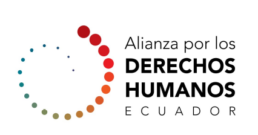
Desde las 16h00 aproximadamente 4 líderes indígenas Wampis y un grupo de 14 jóvenes fueron secuestrados por intermediarios ecuatorianos vinculados a la tala y comercialización ilegal de madera en la provincia de Morona Santiago, siendo las 21h30 las 18 personas fueron liberadas.
La Alianza de Organizaciones de Derechos Humanos conoció la denuncia realizada por parte del Gobierno Territorial Autónomo de la Nación Wampis ubicada en territorio peruano fronterizo con Ecuador, en los siguientes términos:
“18 Líderes Wampís han sido detenidos por intermediarios ecuatorianos vinculados a la tala y comercialización ilícita de madera mientras intentaban cruzar del río Santiago al río Morona por la frontera. Se trata de los dirigentes del Gobierno Territorial Autónomo de la Nación Wampís [GTANW] Rosendo Montes, Juan Noningo, Robert Hinojosa y del asesor legal Awajún Gil Inoach; además de 14 jóvenes de la escuela de liderazgo Sharian. Todos ellos se dirigían hacia San Juan de Morona, donde sostendrían un taller de capacitación, pero fueron impedidos de continuar su camino en Puerto Minas por los comerciantes ilegales. Piden que las embarcaciones con madera que han sido detenidas los últimos días por el GTANW, en el Río Santiago, sigan su curso, a cambio de la libertad de los líderes wampís.
Cabe señalar que durante los últimos dos meses, el GTANW ha denunciado a las autoridades nacionales y locales la problemática de la tala y comercio ilegal de madera por parte de ciudadanos ecuatorianos, quienes a vista y paciencia de los controles del Ejército Peruano y SERNANP en las bases de Cahuide y Ampama, salen con embarcaciones llenas de madera obtenida de manera ilegal. Recientemente, la Autoridad Regional Ambiental se comprometió con los Wampís a colaborar con las acciones del GTANW, en el marco de su derecho a la autodeterminación, para frenar la actividad ilícita. Sin embargo, hoy llegaron a la comunidad de Alianza Progreso, en el río Santiago, donde están las embarcaciones detenidas, sin la documentación necesaria para hacer su registro y confiscar la madera.”
Los Gobiernos del Pueblo Shuar Arutam de Ecuador y de la Nación Wampis de Perú, el 12 de noviembre de 2020 sobre la base de “mantener la mancomunidad como pueblos y nacionalidades originarios de libre determinación y fortalecer estrategias para una buena comercialización de los pueblos fronterizos que generen ingresos para sustentabilidad de las familias” decidieron “dar un plazo de 10 días a los comerciantes ecuatorianos para que se retiren del sector con sus máquinas y material preparado” y señalaron que “activaran guardias de seguridad indígena en ambos nacionalidades a fin de normar la incidencia de los comerciantes ilegales”.2
El secuestro de las 18 personas se produjo para presionar a la Nación Wampis a devolver las embarcaciones con madera talada de forma ilegal que fueron confiscadas en uso de su autodeterminación en el mes de noviembre pasado en cumplimiento de las decisiones adoptadas de manera conjunta entre el Pueblo Shuar Arutam y el Gobierno Territorial Autónomo de la Nación Wampis para que se suspendan las actividades de tala y comercio ilegal de madera en sus territorios.
En la noche del 2 de diciembre se conoció que los líderes y los jóvenes secuestrados fueron liberados tras una intervención de la Autoridad Regional Ambiental de Amazonas (ARA) de Perú que ofreció a los madereros 2 días plazo para la regularización de la madera que les fue decomisada por los Wampis.
En virtud de lo anterior, las organizaciones que conformamos la Alianza de Organizaciones de Derechos Humanos, demandamos al Estado ecuatoriano que articule con las instituciones civiles correspondientes de manera inmediata todas las acciones necesarias para garantizar la vida, la integridad y la libertad de las y los miembros tanto del Pueblo Shuar Arutam así como de la Nación Wampis que actúan en defensa y control de su territorio; las amenazas contra su vida y su territorio derivadas del accionar de madereros ilegales ha sido frecuentemente denunciada por estos dos pueblos a las autoridades concernidas sin que hasta la fecha ninguno de los dos estados hayan tomado acciones de control y protección concertadas.
Reiteramos que toda intervención del Estado se la deberá realizar exclusivamente a través de autoridades civiles, entre ellas la Defensoría del Pueblo, el Ministerio de Relaciones Exteriores, en coordinación directa con las y los dirigentes del Pueblo Shuar-Arutam.
La Nación Wampís y el Pueblo Shuar Arutam tienen un territorio ancestral de alrededor de un millón y medio de hectáreas de bosque y comparten un origen cultural común, es por eso que se han reconocido como Territorios de Vida y articulan acciones conjuntas para la defensa sus derechos colectivos y de la naturaleza en ejercicio de su autonomía y autodeterminación.
1 https://mobile.facebook.com/NacionWampis/
2 https://www.facebook.com/cgpsha/posts/2541247669514942
Acuerdo GTANW-PSHA (pero sin firmas de PSHA): https://drive.google.com/file/d/13DW8rRrPDXoqVW-XwYIiHMq7DqywLykU/view?usp=sharing
